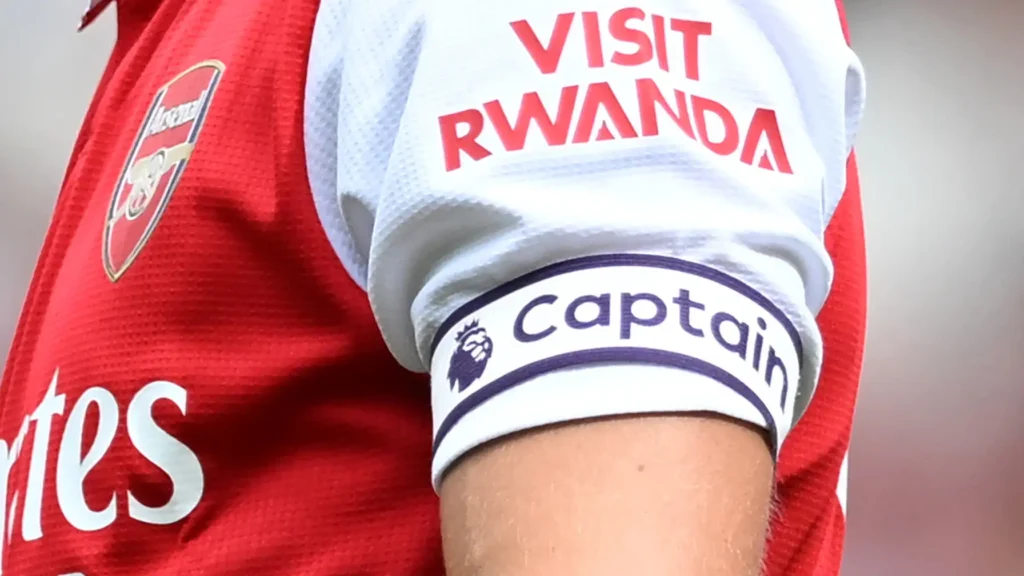KINSHASA, DR CONGO — The Democratic Republic of Congo has urged Arsenal, Bayern Munich, and Paris Saint-Germain to terminate their sponsorship agreements with “Visit Rwanda,” citing the worsening humanitarian crisis in the country.
This appeal comes amidst a significant escalation of the conflict, with the M23 rebel group recently capturing Goma, the largest city in eastern DR Congo.
The United Nations Refugee Agency estimates that over 400,000 people have been displaced within the country this year due to the ongoing violence.
A UN expert panel has concluded that the Rwandan army exerts “de facto control” over the M23 operations, a claim strongly supported by the Congolese government.
In a letter addressed to the owners of Arsenal and PSG, as well as Bayern Munich President Herbert Hainer, DR Congo Foreign Minister Thérèse Kayikwamba Wagner questioned the ethical implications of these sponsorship deals.
Minister Wagner raised concerns about the potential funding sources for Visit Rwanda, suggesting that the illicit mining of “blood minerals” in the occupied territories of DR Congo could be contributing to the tourism revenue.
These minerals are believed to be smuggled across the border into Rwanda and exported internationally.
Furthermore, Minister Wagner emphasized the “incontrovertible” evidence of Rwandan involvement in the conflict, citing a UN report that documented the presence of approximately 4,000 Rwandan troops operating within the DRC.
Given these serious allegations, the Congolese government believes it is morally imperative for these prominent football clubs to sever their ties with Visit Rwanda.
“It is time Arsenal ended its blood-stained sponsorship deals with this oppressor nation. If not for your own consciences, then the clubs should do it for the victims of Rwandan aggression,” she wrote.
Why are the Visit Rwanda deals controversial?
The Visit Rwanda campaign has undeniably elevated the country’s global profile, attracting significant tourism interest. However, critics have accused the Rwandan government of leveraging sports partnerships as a tool for “sportswashing,” an attempt to improve its international image while obscuring serious human rights concerns.
High-profile collaborations with leading football clubs like Arsenal, Paris Saint-Germain, and Bayern Munich have garnered significant attention. The most recent Arsenal sponsorship is reportedly valued at over £10 million ($12.39 million) annually.
Beyond football, Rwanda has expanded its sporting ambitions. President Paul Kagame has expressed interest in hosting a Formula 1 race, and Kigali is set to host the prestigious Cycling World Road Championships in September.
However, these initiatives have drawn criticism from human rights organizations. The Central Africa director at Human Rights Watch, a prominent global watchdog, contends that these sports-related ventures serve to mask Rwanda’s “abysmal track record” on human rights.
The UCI, cycling’s governing body, recently reaffirmed its commitment to hosting the World Championships in Rwanda despite growing concerns. This decision has further fueled the debate surrounding the ethical implications of utilizing sports for image enhancement while serious human rights issues remain unaddressed.
“Rwanda has major flaws with due process which violate its own internal laws or international standards,” HRW’s Lewis Mudge said.
“Increasingly we’re seeing the space for freedom of expression, for some degree of political autonomy, is actually shrinking.”
The Rwandan government has dismissed accusations of sportswashing, with its chief tourism officer Irene Murerwa calling them “a distraction” from the “amazing and outstanding achievements the country has made.”
The United Nations has reported a devastating toll from recent fighting in the Democratic Republic of Congo (DRC), with at least 700 people killed in Goma since Sunday.
UN spokesman Stéphane Dujarric also confirmed 2,800 injuries as the M23 rebel group, backed by Rwanda, seized control of the North Kivu provincial capital.
The M23, an ethnic Tutsi group, has advanced further south towards Bukavu, the capital of South Kivu province, raising serious concerns about a further escalation of the conflict. This ongoing crisis in eastern DRC has deep roots, dating back to the 1990s.
While the M23 claims to be fighting for the rights of the Tutsi minority, the Congolese government accuses Rwanda of backing the rebels in a bid to control the region’s rich mineral resources.
The Rwandan government denies direct military involvement, stating that its troops are stationed along the border for defensive purposes and to protect its own citizens.
This situation highlights the urgent need for a de-escalation of the conflict and a return to peaceful dialogue to address the underlying political and security issues.


